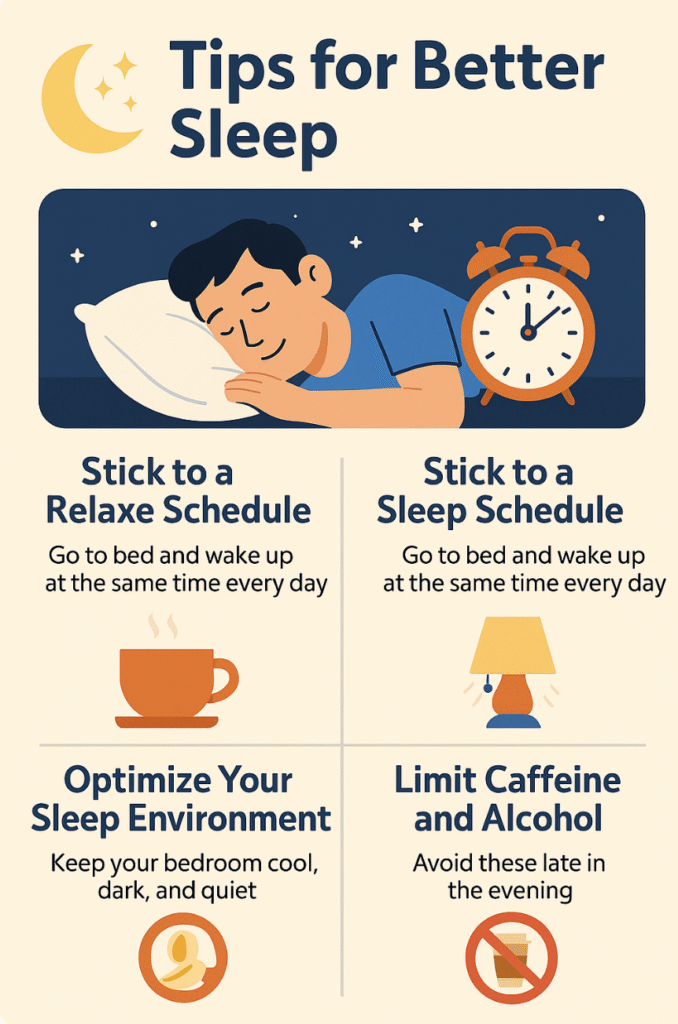Sleep is not a luxury — it’s a biological necessity that affects every organ, hormone, and emotional process in the body. Yet, in today’s fast-paced, screen-saturated world, millions struggle with insomnia or poor-quality sleep. According to the Centers for Disease Control and Prevention (CDC), about one in three adults in developed countries don’t get enough sleep, leading to increased risks of chronic illness, depression, and reduced productivity.
This article explores evidence-based sleep strategies that align with the Google Health Content Policy and E-E-A-T principles (Experience, Expertise, Authoritativeness, Trustworthiness) — designed to help readers improve sleep quality naturally and safely.
🌙 Why Sleep Matters
Sleep is when the body repairs tissues, consolidates memories, and regulates metabolism. During deep sleep, the brain clears metabolic waste via the glymphatic system, and the immune system strengthens its defenses. Poor sleep, conversely, can increase inflammation, raise blood pressure, and impair decision-making.
💤 The Science of the Sleep Cycle
A normal sleep cycle includes four stages:
- Light Sleep (Stages 1–2): Transition between wakefulness and deeper rest.
- Deep Sleep (Stage 3): Physical repair and growth hormone release.
- REM Sleep (Stage 4): Emotional processing, memory storage, and creativity boost.
An ideal night’s sleep cycles through these stages 4–6 times, each lasting about 90 minutes.
🕒 Establishing a Consistent Sleep Schedule
Your circadian rhythm — the internal biological clock — thrives on consistency. Going to bed and waking up at the same time each day helps synchronize hormones like melatonin (the sleep hormone) and cortisol (the wakefulness hormone).
📖 Tip: Avoid sleeping in more than one hour past your regular wake-up time, even on weekends.
🛏️ Optimizing Your Sleep Environment
- Temperature: Keep your room between 18–20°C (64–68°F).
- Lighting: Limit blue light exposure from phones and computers at least 60 minutes before bed.
- Noise: Use white noise or earplugs to minimize disruption.
- Bedding: Comfortable mattresses and breathable fabrics make a measurable difference in sleep depth.
☕ Limit Caffeine and Alcohol
Caffeine blocks adenosine, the neurotransmitter responsible for sleep pressure. Its effects can last up to 8 hours. Alcohol, though initially sedative, fragments REM sleep later in the night.
🔗 Source: Sleep Foundation – Caffeine and Sleep
🧘 Practice Relaxation Before Bed
Wind down with calming activities:
- Meditation or prayer
- Reading a physical book
- Deep breathing (4-7-8 technique)
- Light stretching
Avoid emotionally stimulating content or late-night discussions that elevate adrenaline or stress hormones.
📱 Technology and Sleep Hygiene
Exposure to blue light suppresses melatonin production. Tools like Night Shift (iOS) or f.lux (desktop) can help, but total screen avoidance before bedtime remains best.
🧠 The Role of Mindset
Cognitive Behavioral Therapy for Insomnia (CBT-I) has proven to be one of the most effective non-pharmacological treatments for chronic sleep problems. It reframes negative thoughts about sleep and introduces practical relaxation techniques.
Learn more via the American Academy of Sleep Medicine.
🌅 The Morning Routine That Starts at Night
Better sleep begins with good morning habits — natural sunlight exposure within 30 minutes of waking helps reset the circadian clock and improves evening melatonin production.
💡 Key Takeaway
Better sleep equals better health. Through mindful bedtime habits, consistent routines, and environmental adjustments, you can regain restful nights without dependency on medication.
🇰🇷 Premium Korean Ginseng Online Shop







